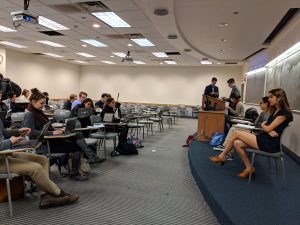Georgetown students elected seven class of 2029 GUSA senators and four at-large GUSA senators this week, the Election Commission announced via X Saturday morning.
Out of a packed field of 26 candidates, the seven new class of 2029 senators are Dima Al-Quzwini (SFS ’29), Constantine Filippatos (SFS ’29), Iris Cho (SOH ’29), Sam Baghdadchi (CAS ’29), Angelina Kou (CAS ’29), Ishaan Jordan (CAS ’29), and Simon Maxwell (CAS ’29).
In a close election for the four at-large senate seats, Evan Cornell (CAS ’27), Kat Scarborough (CAS ’26), Luke Schneeman (CAS ’28), and Youngsung Sim (SFS ’27) ultimately claimed victory. The at-large senators are elected by sophomores, juniors, and seniors to serve the interests of the broader student body.
“I feel extremely honored to know that so many people have put their trust in me to deliver on their behalf within the Senate, GUSA, and in conversations with administration,” Cornell wrote to the Voice, after placing first across all rounds of voting.
While this election cycle has been notably contentious, including multiple campaign violation complaints in the executive race and a challenge to Cornell’s ability to run from abroad, Sim said that all the senators are looking forward to working together.
“I know this election has been very competitive and intense, but at the end of the day, GUSA Senate is very cooperative,” Sim said in an interview with the Voice. “Any partisan tensions are ultimately quelled by how much we want to serve the student body and see changes.”
Candidates largely ran on platforms around improving campus life and facilities, as well as supporting student organizations. Through interviews and town halls, the Voice staff compiled introductions to each of the new 11 senators.
Class of 2029
Dima Al-Quzwini (SFS ’29)
Al-Quzwini was inspired to run for GUSA because of her experience in the First-Year Orientation to Community Involvement (FOCI) pre-orientation program this summer, which focused mainly on public service.
“I really want to be more involved in the Georgetown community and make sure I’m somebody who’s making a difference on campus,” Al-Quzwini said.
Her main goals are advocating for more frequent transportation options, extended Leo’s hours, increased laundry credit, and more reasonable prices for key replacement. Al-Quzwini said her policy choices were based on feedback from students.
“A lot of people are running their campaign based on what they think Georgetown would want as opposed to asking people,” Al-Quzwini said. “Every single policy I’ve announced is something I’ve talked to students about and asked ‘What do you want me to change?”
Al-Quzwini also hopes to achieve active outreach through regular student-wide surveys about GUSA effectiveness.
“We need to be making sure we’re an active part of the space we’re in, not passive,” she said.
Constantine Filippatos (SFS ’29)
With leadership experience in four large clubs at high school, Filippatos believes he can coordinate with administration to gather necessary resources and enact change at Georgetown.
Filippatos’s platform prioritizes improving printer function at Lauinger Library, allowing all students the option of physical GOCards, and doubling the allotted laundry balance.
“I stand up for what I believe in,” Filippatos wrote to the Voice. “It’s the reason I have the best chance of pushing through the policies which really matter to freshmen.”
Iris Cho (SOH ’29)
Cho hopes to make Georgetown more comfortable for its students.
“The future I see for Georgetown students is everyone feeling that they have a safe, connected home,” she said. “I want students to have assurance that if they express complaints, they’ll have people who will actually listen and make that change.”
Cho’s platform advocates for more thorough responses from facilities regarding maintenance, as well as more frequently cleaned residential halls and more trash cans around campus. She also intends to ask competitive clubs to publish acceptance rates and selection criteria each year.
Sam Baghdadchi (CAS ’29)
Baghdadchi said he will advocate for a more efficient and transparent allocation of Student Activity Fees.
Baghdadchi said he will focus on material campus improvements. He plans to work with the Department of Facilities to replace the shower heads in freshman dorms and install an orange juice machine at Epi’s. As a Government and Environment & Sustainability double major and a general member of Eco Consultants, Baghdadchi also wants to improve recycling on campus.
“I’m interested in making a difference through the small things,” Baghdadchi said. “I’m running for GUSA because I want to work to find tangible solutions to tangible problems.”
Angelina Kou (CAS ’29)
Kou’s policy platform has three main pillars: food, study spaces, and campus fun. Kou aims to bring back the former “Late Night Buffet” menu at Epi’s, as well as provide more dining options for students with dietary restrictions. She suggested collaborating with Bodega and Royal Jacket to have ready-made sandwiches available for those students.
Kou said that she brings a “fresh perspective” to her class, in part because of her conversations with GUSA senators about former university regulations. Because much of the freshman class doesn’t know about former citation rules or the previous buffet, they don’t see the same possibilities for change, according to Kou.
Kou also aims to increase hours in the Bioethics library through a voluntary staffing system.
Ishaan Jordan (CAS ’29)
Jordan’s main policy points include reducing social restrictions and improving freshmen dorms. He advocates for more safe spaces for LGBTQ+ students, as well as increasing equity for first-generation students at Georgetown.
“There are a lot of indirect costs that come with coming to college, especially for first-years, that aren’t always addressed,” Jordan said.
Jordan also hopes to reduce restrictions on parties on campus, saying they create an unsafe precedent of partying off campus, where students cannot be reached by university services.
His main goal is to make Georgetown feel more comfortable for its students.
“This shouldn’t feel like four years away from home,” Jordan said. “This should feel like your new home.”
Simon Maxwell (CAS ’29)
Maxwell did not respond to the Voice’s requests for comment.
At-large senators
Evan Cornell (CAS ’27)
Cornell hopes to help address the issues most important to Georgetown students as an at-large senator.
“I know that with being elected to represent three classes on our campus there comes a great responsibility and duty to deliver on what matters most,” Cornell wrote to the Voice after his election.
At the core of this mission is a desire to amplify student voices.
“So much about the Georgetown experience is incredible, from the people to the place to the endless opportunities,” Cornell wrote. “Yet, we see time and again students’ voices being ignored and left out of important conversations.”
Cornell previously served as a GUSA Senator and Chair of the Ethics and Oversight Committee before stepping down to study abroad. He cites previous successes such as increased furniture in the HFSC, dining and housing reforms, and putting new trash cans around campus.
As an at-large Senator, Cornell hopes to pick up where he left off, starting with addressing issues around housing.
“We just completed construction on and opened a brand new residential complex, and yet as students return from abroad in the Spring, there are somehow not enough beds for students to live comfortably,” Cornell wrote. He also plans to work to make the housing and dining accommodation process more transparent.
Kat Scarborough (CAS ’26)
Scarborough’s main priority as GUSA senator will be helping expand access to clubs across the student body, according to her campaign Instagram. Scarborough was previously co-president of H*yas for Choice.
Scarborough did not respond to requests for comment from the Voice.
Luke Schneeman (CAS ’28)
Schneeman hopes to create a Georgetown that prioritizes student life. His main campaign goals include reducing consequences for first-time noise violations and pushing for student voices to be included in the reconstruction of Vil A.
“The Vil A rooftops are one of the few places where the Georgetown community comes together, and it is crucial that we still have access to these community gathering spaces after the renovation,” Schneeman wrote.
He sees GUSA as a way to make tangible change for students.
“I love Georgetown, and I know there are ways we can make our time here better through GUSA,” he wrote. “Students are the backbone of this university, and we deserve more from the [university] administration.”
Youngsung Sim (SFS ’27)
With his reelection, Sim plans to continue the work he started as senator this past year.
Sim currently serves as Deputy Director of Campus and Social Life in the GUSA Senate, focused on improving student spaces on campus, such as the Healey Family Social Room, Lauinger Library, and other communal locations.
One of his main goals this year is establishing a hotline for students to contact Residential Living with critical living concerns, he said in an interview with the Voice following his election.
“There are no fast or efficient ways to communicate with Res Living,” Sim said. He hopes to change that.
Sim also emphasized the importance of GUSA as a voice for the student body.
“There are tangible things that are happening,” Sim said. “Even if GUSA doesn’t always do a good job publicizing these things, there are changes.”







